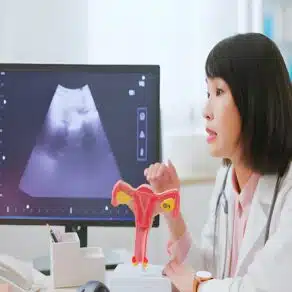Endometriosis is a complex and often painful condition that affects millions of women worldwide. While it’s widely known for causing pelvic pain and discomfort, many may not realize that endometriosis can also lead to significant back pain. Can endometriosis cause back pain? Understanding the connection between endometriosis and back pain is crucial for proper diagnosis, management, and relief.
Endometriosis occurs when the tissue similar to the lining of the uterus grows outside of the uterus. This tissue, called endometrial-like tissue, can develop on the ovaries, fallopian tubes, outer surface of the uterus, and other pelvic organs. When this tissue becomes irritated, inflamed, or forms scar tissue, it can result in a range of symptoms, including pelvic pain, painful periods, and infertility. However, the effects of endometriosis are not confined to the pelvic region alone.
Table of contents
- Understanding the Nature of Endometriosis-Related Back Pain
- Inflammation and Nerve Involvement:
- Pelvic Floor Dysfunction:
- Impact on Daily Life and Quality of Life:
- Holistic Approach to Management:
- Diagnosis and Treatment Options:
- Advocacy and Awareness:
- Seeking Help and Support:
- Empowering Through Knowledge:
Understanding the Nature of Endometriosis-Related Back Pain:
- Endometriosis-related back pain is often described as a deep, dull ache that may radiate from the pelvic region to the lower back. This pain can be chronic or intermittent and may worsen during menstruation or sexual activity. The exact mechanisms behind endometriosis-related back pain are not fully understood, but several factors may contribute to its development.
Inflammation and Nerve Involvement:Inflammation and Nerve Involvement:
Endometriosis lesions can cause inflammation in the pelvic region, which may irritate nearby nerves that extend into the back. This irritation can lead to referred pain, where discomfort is felt in areas away from the source of the problem. Additionally, scar tissue formation from endometriosis can tether pelvic organs, leading to tension and pain that radiates to the back.
Pelvic Floor Dysfunction:
Endometriosis can also contribute to pelvic floor dysfunction, which occurs when the muscles, ligaments, and connective tissues in the pelvic area become tight, weak, or imbalanced. Can endometriosis cause back pain? Pelvic floor dysfunction can manifest as pain not only in the pelvic region but also in the lower back and hips. This interconnectedness underscores the importance of addressing pelvic floor issues in managing endometriosis-related back pain.
Impact on Daily Life and Quality of Life:
The presence of back pain alongside other symptoms of endometriosis can significantly impact a person’s daily life and overall quality of life. Chronic pain can lead to decreased mobility, productivity, and emotional well-being. It’s essential for individuals experiencing endometriosis-related back pain to seek proper medical evaluation and treatment to address both the physical and emotional aspects of their condition.
Diagnosis and Treatment Options:
Diagnosing endometriosis-related back pain often involves a comprehensive evaluation by a healthcare provider, including a thorough medical history, physical examination, and possibly imaging studies such as ultrasound or MRI. Treatment options for endometriosis-related back pain may include:
- Pain management strategies such as over-the-counter or prescription medications.
- Hormonal therapies to suppress menstruation and reduce the growth of endometrial-like tissue.
- Physical therapy to address pelvic floor dysfunction and improve musculoskeletal function.
- Surgical interventions to remove endometriosis lesions and scar tissue.
Holistic Approach to Management:
Taking a holistic approach to managing endometriosis-related back pain is essential for long-term relief and improved quality of life. Can endometriosis cause back pain? This comprehensive approach may involve a combination of medical treatments, lifestyle modifications, and complementary therapies such as acupuncture, yoga, and dietary changes. Additionally, seeking support from healthcare professionals, support groups, and loved ones can provide valuable emotional support throughout the journey.
Advocacy and Awareness:
Increased advocacy and awareness are crucial for improving the diagnosis, treatment, and support available for individuals living with endometriosis-related back pain. Can endometriosis cause back pain? By sharing personal experiences, raising public awareness, and advocating for research funding, we can work towards better understanding and management of this challenging condition.
Seeking Help and Support:
If you’re experiencing persistent back pain or other symptoms suggestive of endometriosis, don’t hesitate to seek help from a healthcare professional. Early diagnosis and intervention are key to preventing complications and improving outcomes. Remember, you’re not alone, and support is available.
Empowering Through Knowledge:
- Educating oneself about endometriosis and its potential impact on back pain empowers individuals to take an active role in their healthcare journey. By understanding the connection between endometriosis and back pain, individuals can advocate for themselves, seek appropriate treatment, and make informed decisions about their health and well-being.
- Conclusion: Can endometriosis cause back pain? Absolutely. By recognizing the complex interplay between endometriosis and back pain, we can better support those affected by this condition. Through continued research, advocacy, and support, we can strive to improve the lives of individuals living with endometriosis-related back pain and work towards a future where effective treatments are accessible to all.




